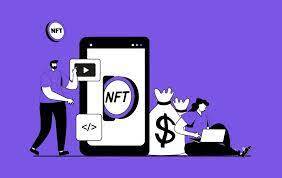In the ever-evolving landscape of digital assets, Non-Fungible Tokens (NFTs) have emerged as the trailblazers. These unique tokens, residing on blockchain technology, represent ownership of digital or physical items. Embarking on the journey of decentralized dreams, visionary minds are actively engaged in NFT marketplace development, weaving the fabric of tomorrow’s digital economy where unique assets and creativity converge seamlessly.The NFT market has grown exponentially, sparking a new era of decentralized dreams and possibilities.
The Rise of NFTs
NFTs gained prominence due to their ability to authenticate and verify ownership of digital assets. Artists, musicians, and even sports personalities embraced this technology, leveraging it to monetize their creations directly. The advent of blockchain, particularly Ethereum, provided the foundation for the creation and trading of NFTs.
Blockchain: The Backbone
Blockchain, the decentralized ledger technology, forms the backbone of NFTs. It ensures transparency, security, and immutability. Every transaction, every ownership transfer is recorded in a tamper-proof manner. This foundational element has fostered trust among creators and buyers alike, paving the way for the widespread adoption of NFTs.
The Need for Decentralization
Centralized platforms dominated the early stages of the NFT market. However, as the community expanded, concerns about censorship, control, and the environmental impact of energy-intensive blockchains surfaced. Decentralization became a rallying cry, pushing the industry to explore alternative and eco-friendly solutions.
Enter Decentralized NFT Marketplaces
Decentralized NFT marketplaces are the next frontier in the evolution of this digital asset ecosystem. Unlike their centralized counterparts, these platforms operate on decentralized networks, eliminating the need for intermediaries. Ethereum alternatives, such as Binance Smart Chain and Flow, have gained traction for their efficiency and reduced environmental impact.
Advantages of Decentralization
Decentralization offers several advantages. Firstly, it promotes censorship resistance. No central authority can dictate what can or cannot be traded on these platforms. This ensures that artists have the freedom to express themselves without fear of suppression.
Secondly, decentralization enhances security. Traditional centralized platforms are susceptible to hacks and data breaches. In contrast, decentralized systems distribute data across a network, making it more resilient to attacks.
Moreover, decentralized marketplaces reduce transaction costs. Without intermediaries, fees associated with buying and selling NFTs decrease, benefiting both creators and buyers. This financial efficiency aligns with the core principles of blockchain technology.
Challenges on the Horizon
However, decentralization is not without its challenges. Scalability issues on some blockchain networks can result in slower transaction times and higher fees during periods of high demand. Overcoming these hurdles is crucial for the widespread adoption of decentralized NFT marketplaces.
The Role of Smart Contracts
Smart contracts, self-executing contracts with the terms of the agreement directly written into code, play a pivotal role in decentralized NFT marketplaces. These contracts automate the process of buying, selling, and transferring ownership of NFTs, reducing the need for intermediaries and streamlining transactions.
Evolving Ecosystem: Beyond Ethereum
While Ethereum has been the go-to platform for NFTs, its scalability challenges have prompted the exploration of alternative blockchains. Binance Smart Chain, known for its lower fees and faster transaction times, has emerged as a viable option. Flow, designed for consumer-scale blockchain adoption, offers another avenue for decentralized NFT marketplaces to thrive.
Interoperability: Bridging Blockchains
Interoperability is a crucial aspect of the decentralized dreams for NFT marketplaces. Projects like Polkadot and Cosmos aim to create a connected blockchain ecosystem, enabling assets to move seamlessly across different blockchains. This interoperability fosters collaboration and expands the possibilities for decentralized NFT marketplaces.
Community Governance: Empowering Participants
Decentralized NFT marketplaces often incorporate community governance models. Token holders have a say in the platform’s development, decision-making processes, and even the addition or removal of features. This democratized approach empowers users, aligning with the decentralized ethos.
Environmental Concerns: Navigating the Green Path
The environmental impact of blockchain technology, particularly proof-of-work consensus mechanisms, has been a point of contention. Decentralized NFT marketplaces are exploring eco-friendly alternatives, such as proof-of-stake, to minimize their carbon footprint. Striking a balance between innovation and environmental responsibility is essential for the sustainable growth of the NFT ecosystem.
Inclusivity: A Decentralized Vision
Decentralized NFT marketplaces strive for inclusivity. They aim to democratize access to the world of digital assets, enabling artists and creators from diverse backgrounds to participate. This vision aligns with the principles of decentralization – breaking down barriers and providing equal opportunities for all.
Emerging Trends: The Future Unfolding
As decentralized NFT marketplaces continue to evolve, several trends are shaping the future. Fractionalized ownership allows multiple investors to own a share of an NFT, making high-value assets more accessible. Virtual and augmented reality integration creates immersive experiences for NFT owners, enhancing the perceived value of their digital assets.
The Role of Artificial Intelligence
Artificial Intelligence (AI) is increasingly becoming intertwined with NFTs. AI algorithms analyze market trends, helping creators and investors make informed decisions. Additionally, AI-generated art is making waves in the NFT space, challenging traditional notions of creativity and authorship.
Legal Frameworks: Navigating Uncharted Territory
The decentralized nature of NFTs poses challenges for legal frameworks. Determining ownership rights, resolving disputes, and ensuring compliance with existing laws require careful consideration. As the industry matures, legal frameworks will need to adapt to provide clarity and protection for all stakeholders.
Conclusion: Crafting the Decentralized Future
In conclusion, decentralized dreams are reshaping the landscape of NFT marketplaces. The move towards decentralization addresses concerns about censorship, security, and environmental impact. Smart contracts, alternative blockchains, and community governance are pivotal in crafting a decentralized future.
As the industry navigates challenges, including scalability and environmental sustainability, it is on the brink of a transformative era. Decentralized NFT marketplaces have the potential to redefine ownership, empower creators, and revolutionize the way we perceive and trade digital assets.
The journey towards tomorrow’s NFT marketplace is marked by innovation, inclusivity, and a commitment to decentralization. As the technology continues to advance and the community actively participates in shaping its future, decentralized dreams are gradually becoming a tangible reality.


